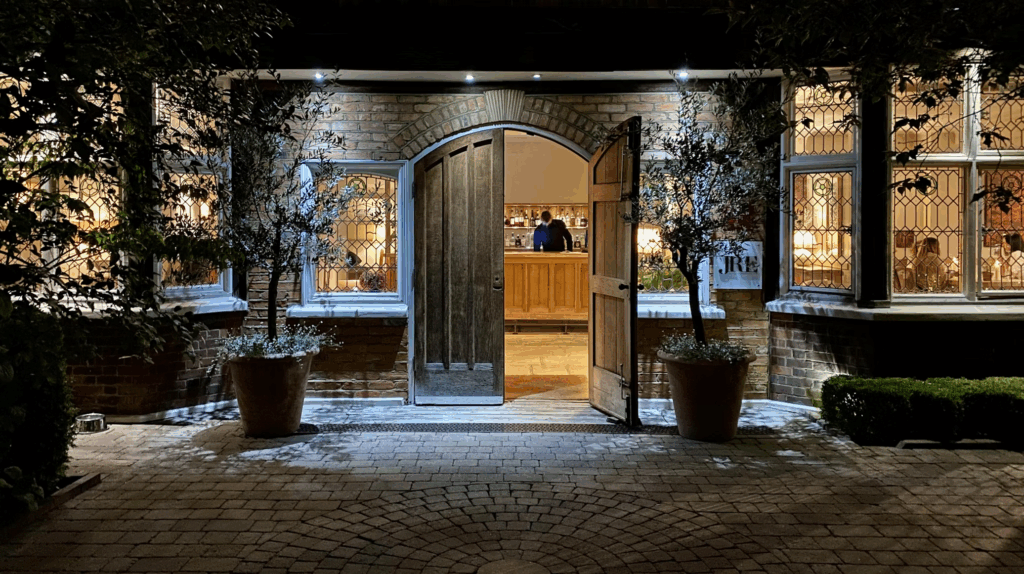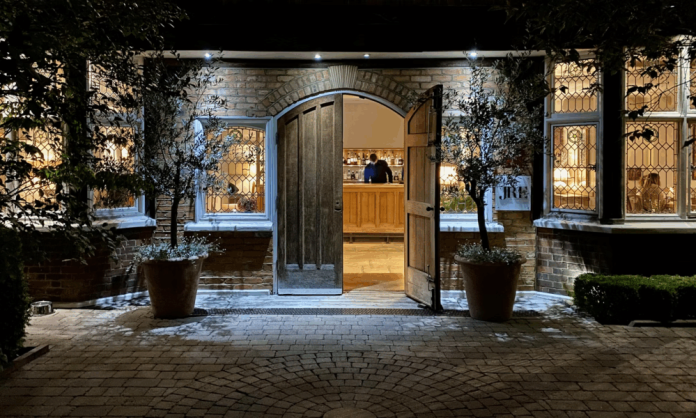She paused just inside the entrance, blinking as her eyes adjusted to all that light. The hostess, elegant and trained to read guests like an algorithm, intercepted her with a polite, polished smile.
“Good evening,” she said, tone cool and rehearsed. “This is a fine-dining establishment. I’m not sure this is what you’re looking for.”
The woman’s voice was steady. “I’m exactly where I need to be. A table for one, please.”
The pause that followed was brief but heavy. Then, with reluctant grace, the hostess led her to the farthest corner—beyond the glow of the chandeliers, beside a wall sconce whose light didn’t quite reach the tablecloth. It was the seat reserved for people who don’t quite fit the room.
A few guests looked up. One or two smirked. The orchestra played on.

Ordering the Cheapest Thing on the Menu
A young waiter approached with a warmth that didn’t match the chill in the air. His name tag said Luis, slightly crooked, his apron neatly pressed.
“Good evening,” he said softly. “Can I bring you something to drink?”
“Just water, please. Hot, if that’s all right.”
“Of course.”
When he returned, she was still reading the menu, eyes calm as they passed down a column of numbers that would frighten most people. “Tell me,” she said, “what’s the least expensive soup you serve?”
“Garden broth,” he replied, almost apologetically. “Simple, but good. The stock’s made from scratch.”
She smiled. “Then that’s what I’ll have. And if I could trouble you for extra hot water on the side?”
From a nearby table came the sound of laughter that wasn’t about joy—sharp, sparkling, performative. Someone whispered, “She’s here for hot water.” Another said, “In that coat?”
A phone camera flashed. The hostess looked away. Only Luis met her eyes, the empathy there too quiet to draw attention.
A Quiet Grace in a Loud Room
When the soup arrived—golden, fragrant, steam curling upward like prayer—the woman wrapped her hands around the bowl, as though the warmth itself were a gift.
She didn’t eat quickly. Each spoonful was deliberate, reverent. She tasted not just the vegetables but the care it took to make them tender.
Around her, the dining room performed its nightly ballet: waiters gliding, glasses refilled, laughter rehearsed for social media. At one table, a birthday was being staged—sparklers, phones, and forced delight.
The woman noticed everything. How the dishwasher’s hands, still damp from the back sink, trembled slightly when he carried glassware. How the busser rolled his wrist when he thought no one was watching. How Luis never once made her feel small.
When he stopped by to ask if the soup was all right, she said simply, “It tastes like care.”

The Envelope Left Behind
When her bowl was empty, she folded her napkin neatly and reached into her coat pocket. Instead of a wallet, she pulled out a thick, cream-colored envelope sealed with a sprig of pressed rosemary.
“For your manager,” she said to Luis. “And please—would you ask the entire team to come to the dining room? The kitchen staff, too, if they’re willing.”
Alarm flashed across the hostess’s face. “Madam, if there’s an issue—”
“There isn’t,” the woman said. “There’s an opportunity.”
Moments later, the manager arrived—stiff collar, cautious smile. Luis handed him the envelope. He opened it, read, then read again. His hands trembled.
“Staff to the floor,” he said quietly. “Now, please.”
The music faltered to a stop.
The Woman Everyone Finally Saw
Cooks emerged from the kitchen still in aprons. The dishwasher wiped his hands on his jeans. The hostess lingered near the podium, unsure whether to stand tall or disappear.
The woman rose from her seat, her posture straight, her voice calm but carrying easily across the room.
“My name is Eleanor Hart.”
A ripple moved through the guests. Some recognized the name—Hart Foundation, scholarships, philanthropy. Others only felt the sudden shift in atmosphere, the sense that something important was happening.
“My late husband and I built the Hart Foundation,” she said, “to support hospitality workers—the people who make nights like this possible, and who are too often unseen.”
The dining room fell completely silent.
“I visit restaurants unannounced,” Eleanor continued. “I don’t come to judge the food. I come to see how people treat the person at the smallest table, ordering the simplest thing.”
She turned toward Luis. “You served me with dignity when it cost you nothing and gained you nothing. That matters.”
To the busser, she said, “Your wrist hurts. You’ll soon have ergonomic tools to help. The grant will cover it.”
To the cook peeking nervously from the kitchen door: “Your broth is patient. Keep teaching it.”
Then she lifted the envelope. “Inside is a ten-year grant—enough to fund paid staff meals, mental-health support, and tuition for anyone here who wants to study culinary arts or hospitality. It takes effect tonight.”
Gasps rippled through the room. Someone dropped a spoon.

A Lesson Served Cold and Warm
Eleanor turned her gaze to the hostess, whose cheeks burned crimson. “You,” she said, not unkindly, “guarded the door with judgment. Now you’ll have the chance to guard it with welcome. The grant includes hospitality training for equity and empathy. I hope you’ll lead it.”
The hostess’s eyes filled. “I understand,” she whispered. “I’m sorry.”
The apology, small and real, seemed to melt something in the air.
The Bill Everyone Wanted to Pay
“As for tonight,” Eleanor said, facing the entire room, “your meals are on me—on one condition.”
Chairs creaked. Forks paused.
“You’ll pay it forward, not backward. Choose someone you’d rather not notice, and notice them. Buy them a meal. Offer a job. Listen without needing to post about it.”
The quartet’s cellist set down his bow. The birthday party turned off their phones.
Then came applause—slow at first, then swelling like a tide. From the dish pit, from the kitchen line, from diners whose shame had turned into awe.
A child at the birthday table tugged her mother’s sleeve. “Can we help the people who helped us?” she asked.
Her mother nodded, tearful. “Yes, sweetheart. We can.”
Eleanor smiled. “That’s how it starts.”
The Small Envelope
Before she left, she handed Luis a smaller envelope. “For you. Open it later. And eat something warm when you do.”
He tried to speak, but no sound came.
“Thank you,” he managed finally.
“Eleanor,” she corrected gently. “Not Ms. Hart. Names matter.”
When she walked toward the exit, the chandeliers seemed softer, the room gentler. Even the hostess straightened, as though standing at a different kind of door.
“May your soup always taste like care,” Eleanor said before stepping into the night.

What Stayed Behind
In the weeks that followed, change came quietly. Staff meals appeared every shift, no longer a privilege but a rule. The dishwasher got his new stool. A notice on the corkboard read Tuition Reimbursement Approved.
The hostess began greeting guests with genuine warmth, never again glancing at their shoes before deciding where to seat them.
And every now and then, someone—perhaps a business traveler, perhaps a lonely soul—sat at the same corner table, ordered garden broth, and felt an invisible net of kindness settle around them.
The plaque by the door soon read: Hart Hospitality Grant Recipient — Where Every Table Matters.
The Story That Traveled
A food blogger, who had been at that birthday table, posted the story online. He titled it The Woman Who Ordered Hot Water. Within a week, it had been shared a million times.
Strangers began tipping servers double, sending care packages to restaurant kitchens, asking staff for their names.
Eleanor refused interviews. Her assistant told reporters, “She says the story is enough.”
A Door Held Open for the Next Person
Months later, a young waitress in another city received a scholarship letter from the Hart Foundation. The note inside read:
We saw how you spoke to the man in the wheelchair. Keep seeing people. That’s the recipe.
The girl cried right there in the back alley, wiping her eyes with the corner of her apron.
Kindness, it seemed, had found a way to multiply.
The Gentle Lesson That Remained
Luxury isn’t chandeliers or imported flatware or wine lists heavy enough to ache the wrist. Luxury is dignity shared freely, respect given without proof of worth.
That night, a woman in a worn coat reminded a room full of people that true wealth isn’t money—it’s mindfulness.
Every person who lifts a plate, pours a glass, or opens a door carries a story. Sometimes, the richest heart in the room is sitting at the smallest table, with nothing but soup and gratitude.
And sometimes, a door that begins half-closed can open wide enough to change the world.
Please let us know your thoughts and SHARE this story with your Friends and Family!

